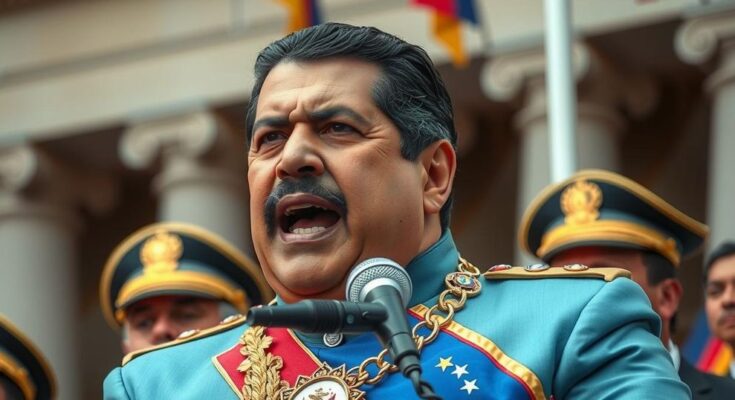Venezuelan President Nicolas Maduro has begun his third term after a controversial election marked by allegations of fraud from opposition leader Edmundo Gonzalez. Despite international condemnation and pressures, Maduro declared victory while promising a path towards peace and prosperity. Protests against his rule continue, led by notable opposition figures, amidst a backdrop of political repression and economic instability in Venezuela.
Venezuelan President Nicolas Maduro has officially assumed his third six-year term following a highly disputed election, wherein his opponent, Edmundo Gonzalez, alleged voter fraud and declared his own victory. Despite international condemnation and sanctions, chiefly from the United States, which recognizes Gonzalez as the rightful winner, Maduro vowed to lead the nation toward peace, prosperity, equality, and democracy. He asserted, “I swear on history, on my life, and I will fulfil [my mandate].”
The contentious situation surrounding Maduro’s inauguration escalated with protests led by opposition leader Maria Corina Machado, who faced temporary detention during her demonstration against Maduro’s regime. Since Maduro’s inception into power after Hugo Chavez’s demise in 2013, his administration has faced severe scrutiny due to accusations of authoritarianism amidst continuous economic and political crises. Opposition figures, including Juan Guaido, have previously contested Maduro’s legitimacy, resulting in the United States and other nations recognizing Guaido as Venezuela’s legitimate president.
In the recent election on July 28, despite the opposition’s claims of a significant victory for Gonzalez reflected in unofficial tally sheets, Venezuela’s electoral authorities sided with Maduro, who proclaimed victory with 51 percent of the votes cast. The lack of transparency surrounding election results has drawn criticism, amplifying the sentiments of opposition leaders who were marginalized during the campaign. Maduro’s assertion of victory has been met with protests, leading to a crackdown by his government, which has seen approximately 2,000 arrests and at least 25 fatalities.
The divided political landscape has compelled the opposition to exert continuous pressure on the Maduro administration, culminating in recent protests organized in anticipation of the inauguration. In a significant international development, Gonzalez, having fled the country after being issued an arrest warrant, met with President Joe Biden to discuss Venezuela’s political repression. The U.S. administration continues to designate Gonzalez as Venezuela’s “president-elect,” highlighting their concerns regarding Maduro’s governance.
Nicolas Maduro has been a prominent figure in Venezuelan politics since Hugo Chavez’s death in 2013, succeeding him and assuming a leadership role in the chaotic political climate marked by economic turmoil and allegations of authoritarianism. The legitimacy of Maduro’s presidency has been a subject of severe contention, especially following contested elections, which have led to mass migrations and severe humanitarian crises in Venezuela. The political opposition, through various leaders, has consistently challenged Maduro, resulting in international recognition of leaders such as Juan Guaido as the legitimate president. Maduro’s recent election underscores the ongoing crisis, with the country divided between government supporters and a determined opposition that seeks systemic change.
In conclusion, Maduro’s assumption of a third term amid widespread allegations of election fraud illustrates the profound political divisions and ongoing turmoil in Venezuela. The situation highlights not only the resilience of the opposition but also the significant international complicity regarding the country’s crisis, particularly the United States’ stance in recognizing the opposition leader as the legitimate president. As the opposition continues to rally against Maduro’s government, the implications for both domestic and international relations remain uncertain, with the possibility of further unrest looming in the near future.
Original Source: www.aljazeera.com




